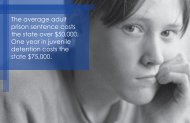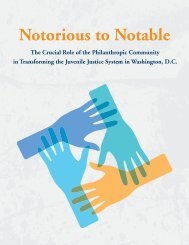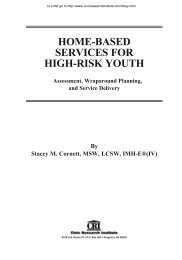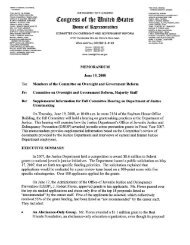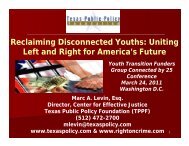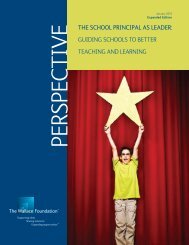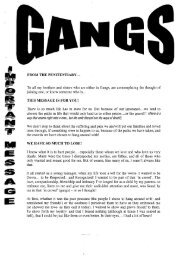Social Media, Social Life: - VJR Consulting - Vicky Rideout
Social Media, Social Life: - VJR Consulting - Vicky Rideout
Social Media, Social Life: - VJR Consulting - Vicky Rideout
Create successful ePaper yourself
Turn your PDF publications into a flip-book with our unique Google optimized e-Paper software.
<strong>Social</strong> Networking<br />
and Depression<br />
According to the self-reports provided in this survey, most<br />
teens today are in good emotional shape: Nearly nine in 10<br />
say it is a lot or somewhat like them that they get along well<br />
with their parents (88%), are happy with their life (87%), do<br />
lots of things well (86%), and like themselves (86%). About<br />
three-quarters say they have lots of friends (76%) and feel<br />
pretty normal compared to other kids their age (73%).<br />
On the negative side of the ledger, about one in four teens<br />
say it’s a lot or somewhat like them that they often feel<br />
rejected by kids their age (28%), are lonely (26%), or often<br />
feel sad or depressed (26%).<br />
For many adolescents—and for many adults—occasional<br />
sadness and depression can be a normal and transitory part<br />
of life. Saying it is “somewhat” like you to “often” feel sad or<br />
depressed may not indicate an overall depressed or sad condition.<br />
For purposes of analyzing the relationship between<br />
social networking and sad or depressed youth, we started with<br />
the 26% who said that often feeling sad or depressed was a<br />
lot or somewhat like them. We then removed youth who indicated<br />
that being happy with life was also like them, honing in<br />
on those teens who were, at least at the time of the survey,<br />
feeling more consistently unhappy. We analyzed how these<br />
less happy young people feel about social networking and<br />
compared them to the happiest group of young people in the<br />
survey (those who said being happy with life was a lot like<br />
them and being sad or depressed was not like them).<br />
In the end, about 10% of respondents fell into the category<br />
of “less happy” teens. The proportion of “less happy” teens<br />
tracks closely with national statistics about the incidence of<br />
depression among adolescents (for example, the National<br />
Institute of Mental Health’s Fact Sheet on Depression in<br />
Children and Adolescents states that 11% of adolescents<br />
have a depressive disorder by age 18).<br />
These “less happy” teenagers have mixed feelings about<br />
social networking’s impact on their social and emotional wellbeing.<br />
They are more likely than the happiest respondents to<br />
say that using their social networking site makes them feel<br />
outgoing (50%) and popular (34%) but are also more likely to say<br />
it makes them feel more depressed (18%, compared to less<br />
than one-half of one percent of the happiest teens). At the<br />
same time, 13% of the least-happy teens say that using their<br />
social networking site makes them feel less depressed and<br />
69% say it doesn’t make much difference one way or the other.<br />
These less happy teenagers — who are also older and more<br />
likely to be female — enjoy posting photos of themselves and<br />
their friends online (73% strongly or somewhat agree that<br />
they “love” posting photos). However, they are also more<br />
likely to feel the stresses associated with online photos: They<br />
are much more likely than the happiest respondents to agree<br />
that they feel stressed about how they look when they post<br />
photos online (54% vs. 12%), to worry they will be tagged in<br />
ugly photos (64% vs. 20%), to feel bad if no one “likes” their<br />
photos online (46% vs. 11%), and, most significantly, to feel<br />
excluded when they see photos of others online (80% vs. 22%).<br />
In addition, these less happy teenagers are more likely to say<br />
that they sometimes wish they could just “unplug,” with 53%<br />
agreeing with that statement strongly or somewhat, compared<br />
to 34% of the happiest respondents. Similarly, 52% of less happy<br />
teens say they sometimes wish they could go back to a time when<br />
there was no Facebook (compared to 28% of happier teens).<br />
Interestingly, a large number of the less happy<br />
teens wish that their parents would spend<br />
less time on their phones and other devices<br />
(42% strongly or somewhat agree with that statement, compared<br />
to 17% of the happier respondents).<br />
Table 26: Happy vs. Less Happy Teens and<br />
<strong>Social</strong> Networking<br />
Among 13- to 17-year-old social network users, percent of<br />
less happy versus other youth who say using their social<br />
networking site makes them feel:<br />
Least happy<br />
teens<br />
Happiest<br />
teens<br />
More outgoing 50% a 17% b<br />
More popular 34% a 15% b<br />
Less shy 49% a 21% b<br />
Less confident 17% a 3% b<br />
Worse about myself 15% a 1% b<br />
Less sympathetic to others 19% a 5% b<br />
More depressed 18% a * b<br />
Less popular 14% a 1% b<br />
Note: An asterisk (*) indicates a value of less than one-half of one percent.<br />
Items with different superscripts differ significantly at the level of p



